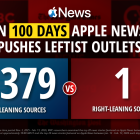The New York Times is whipping social media companies to censor so-called “misinformation” in non-English languages after supposed “[u]nsubstantiated rumors and outright falsehoods” circulated online before the 2020 presidential election.
“The social media accounts pushing misinformation are now targeting audiences in more languages on more topics and across more digital platforms, with scant resistance from social media companies,” New York Times reporter Tiffany Hsu spouted in her story Wednesday.
The piece went on to play aggressive defense for the Biden administration. Hsu wrote that certain social media posts directed at Hispanic Americans were “exaggerating the fallout from inflation,” and that questions about the Internal Revenue Service’s documented plans to hire armed agents were nothing more than “[c]onspiracy theories” that the agency wanted to create a “shadow army.”
What else qualifies as multicultural “misinformation” for The Times?
According to Hsu’s vague wording, it includes: “Misinformation swirling in Chinese on Twitter, YouTube and WeChat about mail-in ballots, school curriculums and hate crimes.” That content could have “’dangerous implications’” this year for Asian American voters, she wrote.
As if they’re not smart enough to weigh information and make election decisions for themselves?
Hsu touted the election-related, so-called anti-“misinformation” efforts of several platforms. She fawned that Chinese Communist Party-linked TikTok translated a “midterms information hub” into more than 45 languages; Twitter has an elections center available in English and Spanish to “pre-bunk” supposed misinformation in different languages; and, the Spanish “misinformation” prediction models of Facebook’s parent Meta in the U.S. are now working “on a par” with English models, which has “significantly increased” the breadth of Spanish content sent to fact-checkers.
Of course, Hsu constructed the crisis in her story that “multilingual fact checkers” can’t “keep pace with the deluge of falsehoods,” and wrote that major social media platforms, including Facebook and YouTube, aren’t doing enough to combat multilingual “misinformation.”
The Times in September used a leftist report from the Stern Center for Business and Human Rights at New York University to call for greater election censorship. Tech companies “bear a responsibility for the false but widespread belief among conservatives that the 2020 election was fraudulent — and that the coming midterms could be, too,” The Times spewed.
Democratic Party Sen. Catherine Cortez-Masto (NV) recently spouted Spanish-language disinformation to sound the alarm about supposed anti-Hispanic hate speech spread by her political opponent Adam Laxalt, the Republican nominee for Nevada’s Senate seat. A Facebook campaign ad for Cortez-Masto took previous comments by Laxalt out of context, accusing him of celebrating the destruction of Hispanic jobs and businesses during COVID-19 lockdowns.
Conservatives are under attack. Contact The New York Times at 1-800-698-4637 and demand that it report through a balanced political lens less than a month before the midterm elections. If you have been censored, contact us at the Media Research Center contact form, and help us hold Big Tech accountable.









